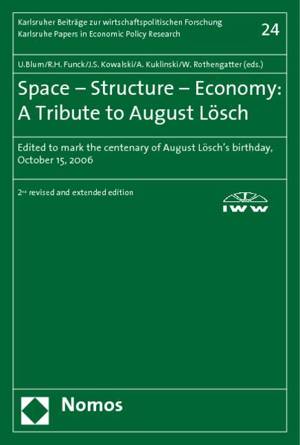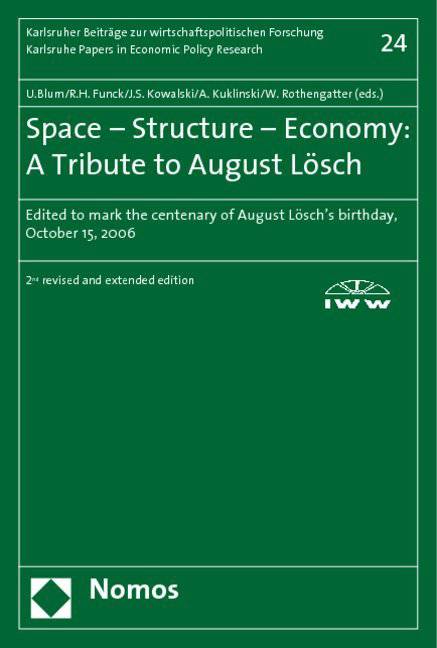
Bedankt voor het vertrouwen het afgelopen jaar! Om jou te bedanken bieden we GRATIS verzending (in België) aan op alles gedurende de hele maand januari.
- Afhalen na 1 uur in een winkel met voorraad
- In januari gratis thuislevering in België
- Ruim aanbod met 7 miljoen producten
Bedankt voor het vertrouwen het afgelopen jaar! Om jou te bedanken bieden we GRATIS verzending (in België) aan op alles gedurende de hele maand januari.
- Afhalen na 1 uur in een winkel met voorraad
- In januari gratis thuislevering in België
- Ruim aanbod met 7 miljoen producten
Zoeken
Space - Structure - Economy: A Tribute to August Lösch
Edited to mark the centenary of August Lösch's birthday, October 15, 2006
€ 79,95
+ 159 punten
Omschrijving
August Lösch (1906-1945) is one of the classics of spatial economic theory. His most important work, "The Spatial Order of the Economy" (Jena 1940), translated into English in 1954 under the - slightly misleading - title "The Economics of Location", became internationally recognized as an important base for regional science. In order to mark the centenary of his birthday, nearly thirty international authors have contributed to this volume.
The authors review Lösch"s role as creator of the general theory of socio-economic development in space from different perspectives. Also, several of his contributions to other fields of economic research are critically evaluated. Various extensions of Lösch"s concept of hexagonal market areas are presented, and new research results considered, e. g. the relevance of different types of economic flows and flow routes for achieving a stable system of spatial structure. Other authors review Lösch"s theoretical approach from the perspective of the New Economic Geography, or discuss the effects of "catastrophic" dynamic forces, as induced, e.g., by innovation.
The final part of the book conveys a more personal view on August Lösch, in particular of his moral strength during the Third Reich, and on his relationship to the city of Heidenheim an der Brenz in South Western Germany, his home town.
The authors review Lösch"s role as creator of the general theory of socio-economic development in space from different perspectives. Also, several of his contributions to other fields of economic research are critically evaluated. Various extensions of Lösch"s concept of hexagonal market areas are presented, and new research results considered, e. g. the relevance of different types of economic flows and flow routes for achieving a stable system of spatial structure. Other authors review Lösch"s theoretical approach from the perspective of the New Economic Geography, or discuss the effects of "catastrophic" dynamic forces, as induced, e.g., by innovation.
The final part of the book conveys a more personal view on August Lösch, in particular of his moral strength during the Third Reich, and on his relationship to the city of Heidenheim an der Brenz in South Western Germany, his home town.
Specificaties
Betrokkenen
- Uitgeverij:
Inhoud
- Aantal bladzijden:
- 416
- Taal:
- Engels
- Reeks:
- Reeksnummer:
- nr. 24
Eigenschappen
- Productcode (EAN):
- 9783832924683
- Uitvoering:
- Paperback
- Gewicht:
- 630 g

Alleen bij Standaard Boekhandel
+ 159 punten op je klantenkaart van Standaard Boekhandel
Beoordelingen
We publiceren alleen reviews die voldoen aan de voorwaarden voor reviews. Bekijk onze voorwaarden voor reviews.








